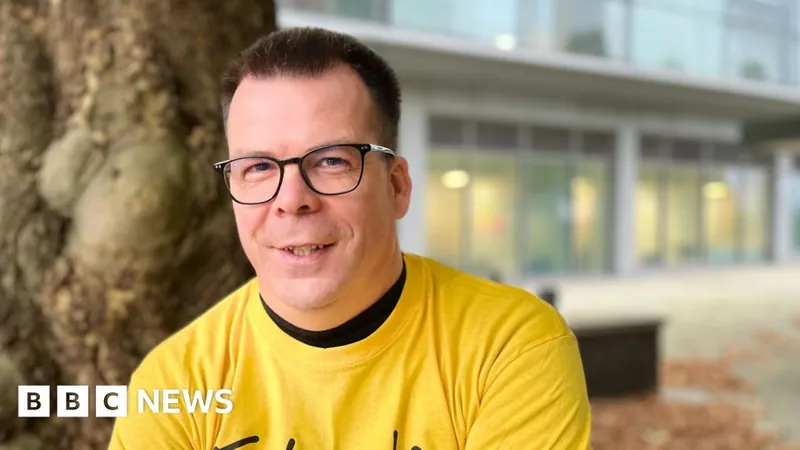
Prostate and Testicular Cancer Survivors Urge Men to Discuss Their Health
2024-11-07
Author: Ming
Prostate and Testicular Cancer Survivors Urge Men to Discuss Their Health
In a bold initiative to raise awareness about men’s health, two cancer survivors are encouraging men to become familiar with their bodies, particularly their testicles and prostate. Their urgent message: "Know your balls and prostate."
Aaron Watson, who faced a testicular cancer diagnosis at the young age of 22, emphasizes the importance of open conversations about men’s health issues. He highlights how societal stigma often discourages men from discussing concerns related to "down there."
Similarly, Ken McBride, 63, shared his harrowing experience, which began with frequent nighttime trips to the bathroom paired with difficulty urinating. Unfortunately, he didn’t recognize these as warning signs of prostate cancer.
Prostate cancer is the most prevalent cancer among men, with recent news capturing attention after Olympic cycling legend Sir Chris Hoy revealed that his cancer had metastasized and was terminal. This stark reality has sparked conversations around the necessity of early detection and the importance of addressing symptoms without hesitation.
The Journey to Diagnosis
Aaron recounted his journey that started with a painful sensation in one testicle. Initially dismissed as a cyst, further evaluation revealed a tumor in the opposite testicle. "I didn’t talk about these things back then," Aaron said, recalling the fear and uncertainty that accompanied his diagnosis. Now, on the other side of treatment, he passionately advocates for men to seek medical advice if they encounter any unusual changes, such as pain or lumps.
"Listen to your doctors," he urges, reflecting on the life-saving advice he received. Following the removal of his testicle, his prognosis looked promising—"a 95% chance the cancer wouldn’t return," he recalled. Today, over two decades later, he remains cancer-free and even celebrated the birth of his second son after treatment.
A key component of Aaron's advocacy is humor. He participates with the charity Friends Of The Cancer Centre and its Talking Balls campaign, which uses witty messaging to break the ice on these delicate topics. One cheeky initiative is called 'Balls on the Falls,' effectively prompting men, particularly along Belfast's Falls Road, to do a self-check while passing by.
Understanding Prostate Cancer
Ken McBride was diagnosed early enough to benefit from immediate treatment, which remains crucial since prostate cancer can often be insidious and symptomless in its early stages. There is currently no definitive test for prostate cancer; instead, various diagnostic measures, including prostate-specific antigen (PSA) blood tests, are employed. However, routine screenings of healthy men are not common due to potentially misleading results.
Prostate oncologist Prof Joe O'Sullivan from Queen’s University Belfast emphasizes that early detection is not a death sentence. In fact, ongoing research and clinical trials in Northern Ireland are pioneering new treatments, offering hope to those diagnosed. Notably, recent trials have shown successful outcomes in treating advanced prostate cancer through innovative combinations of radiotherapy.
With about 1,300 men diagnosed with prostate cancer yearly in Northern Ireland alone, the stakes are high. More than 12,000 men currently live with the disease, and unfortunately, over 280 men succumb to it each year. Despite the statistics, significant advancements in treatment are offering hope. Alarmingly, recent data from the Northern Ireland Cancer Registry indicates an increasing trend in men not receiving treatment for prostate cancer—growing from 26% in 2018-2019 to 33% in 2021.
In conclusion, Aaron and Ken's steadfast commitment to breaking the silence surrounding male health issues is crucial. Their stories serve as a reminder of the importance of awareness, open communication, and timely medical intervention. Men are urged not to shy away from discussing their health concerns—it could save their lives. Don't wait; start the conversation today!




 Brasil (PT)
Brasil (PT)
 Canada (EN)
Canada (EN)
 Chile (ES)
Chile (ES)
 España (ES)
España (ES)
 France (FR)
France (FR)
 Hong Kong (EN)
Hong Kong (EN)
 Italia (IT)
Italia (IT)
 日本 (JA)
日本 (JA)
 Magyarország (HU)
Magyarország (HU)
 Norge (NO)
Norge (NO)
 Polska (PL)
Polska (PL)
 Schweiz (DE)
Schweiz (DE)
 Singapore (EN)
Singapore (EN)
 Sverige (SV)
Sverige (SV)
 Suomi (FI)
Suomi (FI)
 Türkiye (TR)
Türkiye (TR)